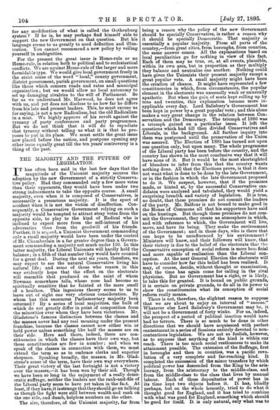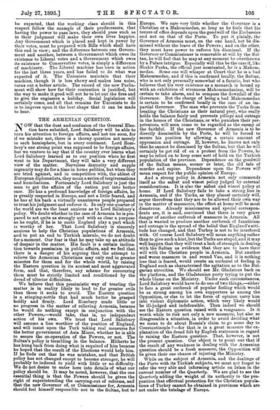THE MAJORITY AND THE FUTURE OF LEGISLATION.
IT has often been said in the last few days that the magnitude of the Unionist majority secures the adoption by the new Government of a strictly Conserva- tive policy. Had they commanded only a few more votes than their opponents, they would have been under two strong inducements to take the opposite course. A small majority, even when it is composed of Conservatives, is necessarily a precarious majority. It is the sport of accident when it is not the victim of disaffection. Con- sequently, a Conservative Government relying on such a majority would be tempted to attract stray votes from the opposite side, to play to the kind of Radical who is inclined to expect more from the self-interest of his adversaries than from the goodwill of his friends. Further, it is argued, a Unionist Government commanding only a small majority would have been under the control of Mr. Chamberlain in a far greater degree than a Govern- ment commanding a majority not much under 150. In this latter majority, the Liberal Unionists will hardly hold the balance ; in a fifth of that number they would have counted for a great deal. During the next six years, therefore, we may expect to see the natural Conservative living his natural life ; and some of those who reason in this way evidently hope that the effect on the electorate will resemble that produced on the saint of whom Newman somewhere tells, whose nose had become so spiritually sensitive that he fainted at the mere _smell of a heathen. This ingenious theory seems to us to leave out of sight one very obvious consideration. By whom has this enormous Parliamentary majority been returned ? By a series of local majorities, the bulk of which do not greatly differ in point of composition from the minorities over whom they have been victorious. Mr. -Gladstone's famous distinction between the classes and the masses never had any real meaning under the present franchise, because the classes cannot now either win or hold power unless something like half the masses are on their side. Here and there, indeed, there are con- stituencies in which the classes have their own way, but these constituencies are few in number; and when we speak of the classes in connection with them, we must extend the term so as to embrace clerks and superior shopmen. Speaking broadly, the masses, in Mr. Glad- stone's sense of the term, have their own way everywhere. Their great victory of the last fortnight is not a victory over the masses,—it has been won by their aid. Though we have been so long in the enjoyment of a really demo- cratic suffrage, neither the leaders nor the rank-and-file of the Liberal party seem to have yet taken in the fail. At least, if they have, it is strange that they should go on talking as though the fight were still between wealth and rank on the one side, and dumb, helpless numbers on the other.
The size, therefore, of the Unionist majority, far from being a reason why the policy of the new Government should be specially Conservative, is rather a reason why it should be specially Democratic. That majority is essentially a popular majority. From all parts of the country,—from great cities, from boroughs, from counties, the same answer comes. All the explanations based on local peculiarities go for nothing in view of this fact. Each of them may be true, or, at all events, plausible, within its own area, but in proportion as they multiply they balance and neutralise one another. Nothing could have given the Unionists their present majority except a great popular vote. A small majority might have been the creation of chance. It might have represented a few constituencies in which, from circumstances, the popular element in the electorate was unusually weak or unusually apathetic. But when the gain of seats kept rolling up by tens and twenties, this explanation became more in- applicable every day. Lord Salisbury's Government has been kept in power by a great popular vote ; and this alone makes a very great change in the relation between Con- servatism and the Democracy. The triumph of 1886 was a triumph gained on a particular issue. It left the questions which had till then divided Conservatives and Liberals, in the background. All further inquiry into them was postponed until the preservation of the Union was assured. The Election of 1895 has turned not upon one question only, but upon many. The whole programme of the Liberal party has been before the country, and the country has shown in the most conclusive way that it will have none of it. But it would be the most shortsighted of blunders to infer from this that the country wants nothing done. All that the Elections prove, is that it does not want what is done to be done by the late Government, or in the fashion in which the late Government proposed to do it. We suspect, however, that if the promises made, or hinted at, by the successful Conservative can- didates were analysed and tabulated, they would yield a surprising breadth and variety of legislation. It is true, no doubt, that these promises do not commit the leaders of the party. Mr. Balfour is not bound to make good in the House of Commons all that his supporters have said on the hustings. But though these promises do not com- mit the Government, they create an atmosphere in which, and with reference to which, the Government will live, move, and have its being. They make the environment of the Government ; and in these days, who is there that can hope to be uninfluenced by his environment ? Ministers will know, and their followers will know, that their victory is due to the belief of the electorate that t he Conservative conception of social reform is more beneficial and more capable of realisation than the Liberal con- ception. At the next General Election the electorate will have to consider how far this belief has been realised. It may, of course, decide, without thought or examination, that the time has again come for calling in the rival physician. But no Government has a right, or is likely, to take this for granted. It is bound on public grounds, it is certain on private grounds, to do all in its power to show the constituencies what its conception of social reform really means.
There is not, therefore, the slightest reason to suppose that we are about to enjoy an interval of " snooze." Whatever else Lord Salisbury's Government may be, it will not be a Government of forty winks. For us, indeed, the prospect of a period of political inaction would have had no terrors. There is so much to be done in other directions that we should have acquiesced with perfect contentment in a series of Sessions entirely devoted to non- contentious legislation. We are not so foolish, however, as to suppose that anything of the kind is within our reach. There is too much social restlessness to make its attainment possible. The extension of the Suffrage, first in boroughs and then in counties, was a pacific revo- lution of a very complete and far-reaching kind. It completed the succession of the minor transfers by which political power has descended from the King to the aris- tocracy, from the aristocracy to the middle-class, and from the middle-class to the class that lives by manual labour. Each of these depositaries of power has in its time kept two objects before it. It has, blindly perhaps, but on the whole honestly, tried to do what it thought good for England, and it has tried to combine with what was good for England, something which should be good for itself. It is only natural, only what was to be expected, that the working class should in this respect follow the example of their predecessors, that having the power to pass laws, they should pass such as in their judgment will make their own lives happier. Any Government which is placed and kept in power by their votes, must be prepared with Bills which shall have this end in view ; and the difference between one Govern- ment and another, between a Government which owes its existence to Liberal votes and a Government which owes its existence to Conservative votes, is simply a difference of machinery. The Liberal machine has been in action for the last three years, and has failed to do what was expected of it. The Unionists maintain that their machine, though it is less showy and makes less noise, turns out a better article. The record of the new Parlia- ment will show how far their contention is justified, but the way to make it good will not be to let out the fires and to give the engineers a holiday. Social legislation will certainly come, and all that remains for Unionists to do is to impress upon it the best shape that it can be made to bear.



































 Previous page
Previous page